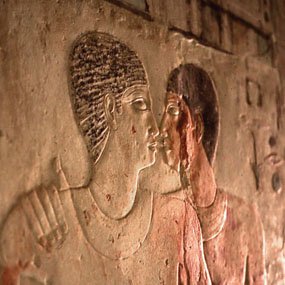How do you answer the verse that says homosexuals will not go to heaven?

Egyptian gay kiss? 2300 BC,
from the British Museum
Thanks for the great question. The verse that is alleged to say, 'homosexuals will not go to heaven' is 1 Cor 6:9.
"Do you not know that the wicked will not inherit the kingdom of God? Do not be deceived: Neither the sexually immoral nor idolaters nor adulterers nor male prostitutes nor homosexual offenders nor thieves nor the greedy nor drunkards nor slanderers nor swindlers will inherit the kingdom of God." -1 Cor 6:9, NIV
There are many problems with translating the Greek word,
arsenokoitai, as homosexual offenders.
First, the arsenokoit stem was NEVER used in the first century to mean homosexual. To help us
define arsenokoites, I've listed on this website the first 56 historical uses of the rare Greek word arsenokoites.
The Thesaurus Linguae Graecae (TLG®),
The Greek Language Thesaurus, is a project of the research center at the University of California, Irvine. Founded in 1972 the TLG has collected and digitized most literary texts written in Greek, from Homer in the 8th century BC to the fall of Byzantium in AD 1453.
The truth is, when we collate every extant Greek manuscript available today, the arsenokoit stem only occurs 77 times in 2400 years of Greek history. 46 of those times, it appears in a vice list quotation from 1 Cor 6:9 or 1 Tim 1:10 and is not defined in those uses.
Second, the concept of homosexuality and the word homosexual are modern constructs. The English word homosexual begins showing up in dictionaries around 1890. There was no Greek word in the first century AD which had the same semantic range as our modern word homosexual.
"No Greek or Latin word corresponds to the modern term 'homosexuality,' and ancient Mediterranean society did not in practice treat homosexuality as a socially operating category of personal or public life.
Sexual relations between persons of the same sex certainly did occur (they are widely attested in ancient sources), but they were not systematically distinguished or conceptualized as such, much less were they thought to represent a single, homogeneous phenomenon in contradistinction to sexual relations between persons of different sexes...
The application of 'homosexuality' (and 'heterosexuality') in a substantive or normative sense to sexual expression in classical antiquity is not advised." - Oxford Classical Dictionary, article on homosexuality.
Because the concept of an exclusive gay or lesbian orientation was not common in the first century and because there was no Greek word with the same semantic range as our modern word homosexual, it is wrong to impose our modern concept on scripture. To read homosexuality into Bible verses which as originally given, did not describe homosexuality, is to add to scripture and to commit spiritual malpractice.
Third, because there are no extant Greek manuscripts which use the word, arsenokoitai, with our modern meaning of homosexual, modern scholars are simply giving their "best guess" as to its meaning, based on breaking down arsenokoites into its parts, arsen, meaning man and koite, mean bed. When arsen and koite are joined together, they form a word which is a euphemism meaning, to have sex.
As noted on our
define arsenokoites page, that is not an accurate way to define the meaning of ancient words. For example, all of us agree that the English word mandate does not mean, a date with a man.
Fourth, it is a terrible sin to guess at the meaning of a Biblical word, as scholars have done with arsenokoites, and with their guess, harm hundreds of millions of gays and lesbians. They've made the Bible say something it never said as originally given in the Greek language.
By translating arsenokoites as homosexual, they've made the Bible condemn lesbians in 1 Cor 6:9 and 1 Tim 1:10. The word arsenokoites is a masculine word and refers to men, not women.
Related information
1. Does the Bible say
homosexuals will go to hell?
2. Is it possible to change
from homosexual to heterosexual?
3. Does becoming a Christian
make you heterosexual?
4. What does the Greek word malakoi
mean in 1 Corinthians 6:9?
5. How should we define malakoi
in 1 Corinthians 6:9?
6. Is there any evidence of an
actual gay marriage in the Bible?
7. Why has God allowed his word to be
so misinterpreted regarding homosexuality?
8. Why and how was
the Bible mistranslated?
From homosexuals will not go to heaven,
Return to Gay Christian 101 Home Page
This page updated October 6, 2012



